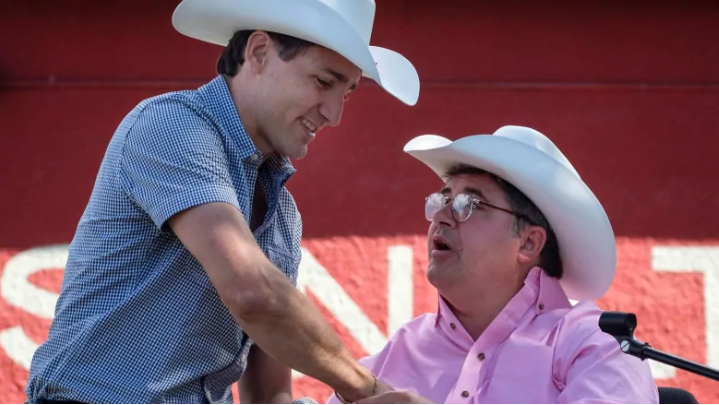
Prime minister attended events in Edmonton, Calgary this week
With only 100 days left until the election, Prime Minister Justin Trudeau likes his chances of picking up seats in Alberta.
“We are going to, not just bring back our MPs, but bring back more MPs to Ottawa,” he told a crowd of supporters in Calgary on Saturday.
The Liberals only have three seats in the province right now, two in Edmonton and one in Calgary. Of the 34 total seats in the province, the Conservatives hold 29.
Seats the Tories occupy are often secured by a wide margin. For example, in the 2015 election Kevin Sorenson, running in Alberta’s Battle River–Crowfoot, had the second-highest share of the popular vote. He also received more votes than any other candidate across Canada.
The prime minister may predict big things for the province, but the current poll numbers don’t seem to support his theory.
Province-wide the Conservatives are at almost 60 per cent support, while the Liberals sit a distant second at 18.5 per cent.
Trudeau acknowledged that people say his party is in trouble in the western province, but ultimately seemed unfazed.
“Every election people say that,” he said. “They were wrong last time, and they’re wrong this time.”
It’s not just the province’s federal voting record that poses a challenge to the governing party. The newly elected United Conservatives under Premier Jason Kenney came to power on an anti-Trudeau message — vowing to stand up to Ottawa.
There’s also a growing sense of alienation in the province.
“Recent polling indicates that as many as 50 per cent of Albertans indicate that they support the concept of secession from the Canadian federation,” Kenney said during a visit to Ottawa in May.
Despite barbs from Kenney, the relationship between the premier and Trudeau has been without drama — so far.
Troubles with Trans Mountain
Trudeau was also in Edmonton Friday at a news conference held at the terminal for the Trans Mountain pipeline. His message was a reiteration of his government’s year-long pitch to the struggling oil sector: Ottawa realizes this project is in the national interest and the environment and economy can work together.
But in Calgary, he turned the blame for the problems in the oilpatch on former prime minister Stephen Harper — saying he failed to diversify Canada’s oil and gas exports, and helped incite anger toward the sector by ignoring the concerns of climate scientists and Indigenous communities. While Harper was in office, pipelines were built from Alberta to Illinois and Wisconsin.
Trudeau said that the Conservatives don’t understand the realities of resource development in the 21st century, and that environmental impacts, partnerships and long-term benefits all have to be taken into account for any new energy projects.
The prime minister said, unlike in John A. Macdonald’s experience with building a railway, you can’t just shove infrastructure through.
Conservative Party Leader Andrew Scheer said in a statement that Albertans won’t forget the Trudeau government’s record on oil and gas.
“Justin Trudeau has failed Albertans,” it reads.
“One day he’s campaigning alongside an anti-pipelines star candidate in Montreal and the next day he’s pretending to care about oil and gas jobs in Alberta. It’s phoney and hypocritical.”
The anti-pipeline candidate
The Liberals just announced famous environmental activist Steven Guilbeault as their candidate in Laurier-Sainte-Marie.
In Edmonton this week, Trudeau went on the defensive for Guilbeault, saying he will not dictate the environmental policies of the Liberals and his opposition to Trans Mountain won’t deter the government from proceeding with the twinning project.
But without shovels in the ground on the project, environmental and resource issues will continue to dog Trudeau in the province up to election day.
Federal-provincial relations
The prime minister was also top of mind as the country’s premiers met for their last annual gathering before the fall vote.
Many of them are engaged in court challenges with Ottawa over the federal carbon tax. That levy will come into effect in Alberta in January, after the Kenney government scrapped the pre-existing provincial cap on greenhouse gas emissions. Alberta’s emissions have risen 50 per cent since 1990 and it is the highest industrial emitter in Canada.
The looming threat of the tax isn’t sitting well with the premier.
“My hope is that the current federal government returns to its initial promise of a co-operative approach to federalism. None of us, nor do our citizens, appreciate a message that it’s either Ottawa’s way or the highway,” Kenney said on Monday afternoon.
Scheer is also using federal-provincial discord to attack Trudeau.
Stuck between federal and provincial pushback, Trudeau’s forecast of more red seats in a blue province may be a hard goal to hit.


